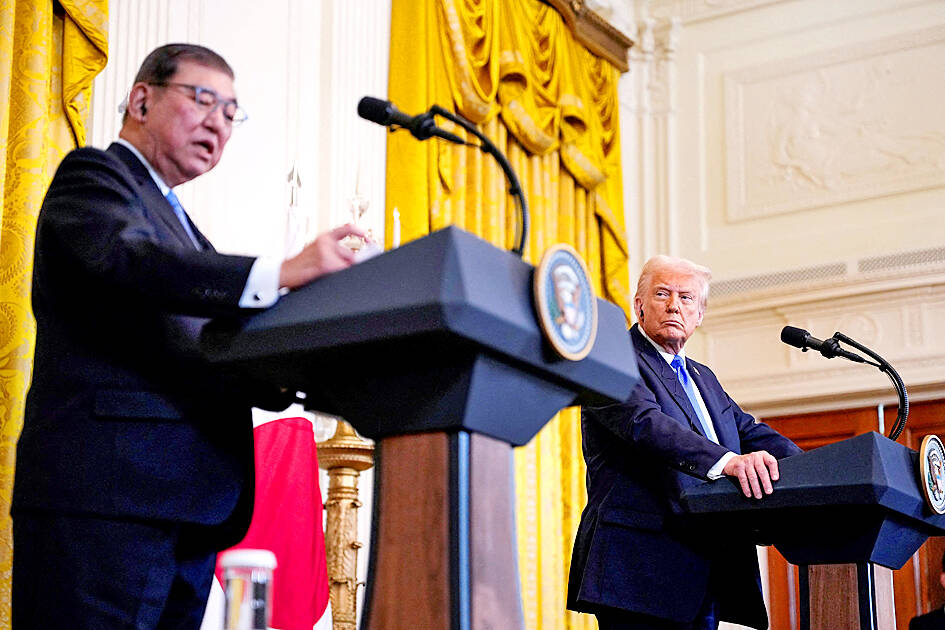Japanese Prime Minister Shigeru Ishiba yesterday expressed optimism that his country could avoid higher US tariffs, saying US President Donald Trump had “recognized” Japan’s huge investment in the US and the American jobs that it creates.
At his first White House summit on Friday, Ishiba told public broadcaster NHK that he explained to Trump how many Japanese automakers were creating jobs in the US.
The two did not specifically discuss auto tariffs, Ishiba said, adding that he did not know whether Japan would be subject to the reciprocal tariffs that Trump has said he plans to impose on imports.

Photo: Reuters
Tokyo has so far escaped the trade war Trump unleashed in his first weeks in office. He has announced tariffs on goods from Canada, Mexico and China, although he postponed the 25 percent duties on his North American neighbors to allow for talks.
The escalating trade tensions since Trump returned to the White House on Jan. 20 threaten to rupture the global economy.
Ishiba said he believes Trump “recognized the fact Japan has been the world’s largest investor in the United States for five straight years and is therefore different from other countries.”
“Japan is creating many US jobs. I believe [Washington] won’t go straight to the idea of higher tariffs,” he said.
Ishiba voiced optimism that Japan and the US can avoid a tit-for-tat tariff war, stressing that tariffs should be put in place in a way that “benefits both sides.”
“Any action that exploits or excludes the other side won’t last,” Ishiba said.
“The question is whether there is any problem between Japan and the United States that warrants imposing higher tariffs,” he added.
Japan had the highest foreign direct investment in the US in 2023 at US$783.3 billion, followed by Canada and Germany, the most recent US Department of Commerce data showed.
Trump pressed Ishiba to close Japan’s US$68.5 billion annual trade surplus with Washington, but expressed optimism this could be done quickly, given a promise by Ishiba to bring Japanese investment in the US to US$1 trillion.
Ishiba yesterday identified liquefied natural gas, steel, artificial intelligence and cars as areas that Japanese companies could invest in.
He also touched on Trump’s promise to look at Nippon Steel Corp investing in US Steel Corp, as opposed to buying the storied US company — a planned purchase opposed by Trump and blocked by former US president Joe Biden.
“Investment is being made to ensure that it remains an American company. It will continue to operate under American management, with American employees,” Ishiba said. “The key point is how to ensure it remains an American company. From President Trump’s perspective, this is of utmost importance.”
On military spending, another area where Trump has pressed allies for increases, Ishiba said Japan would not increase its defense budget without first winning public backing.
“It is crucial to ensure that what is deemed necessary is something the taxpayers can understand and support,” he said.

Real estate agent and property developer JSL Construction & Development Co (愛山林) led the average compensation rankings among companies listed on the Taiwan Stock Exchange (TWSE) last year, while contract chipmaker Taiwan Semiconductor Manufacturing Co (TSMC, 台積電) finished 14th. JSL Construction paid its employees total average compensation of NT$4.78 million (US$159,701), down 13.5 percent from a year earlier, but still ahead of the most profitable listed tech giants, including TSMC, TWSE data showed. Last year, the average compensation (which includes salary, overtime, bonuses and allowances) paid by TSMC rose 21.6 percent to reach about NT$3.33 million, lifting its ranking by 10 notches

Popular vape brands such as Geek Bar might get more expensive in the US — if you can find them at all. Shipments of vapes from China to the US ground to a near halt last month from a year ago, official data showed, hit by US President Donald Trump’s tariffs and a crackdown on unauthorized e-cigarettes in the world’s biggest market for smoking alternatives. That includes Geek Bar, a brand of flavored vapes that is not authorized to sell in the US, but which had been widely available due to porous import controls. One retailer, who asked not to be named, because

SEASONAL WEAKNESS: The combined revenue of the top 10 foundries fell 5.4%, but rush orders and China’s subsidies partially offset slowing demand Taiwan Semiconductor Manufacturing Co (TSMC, 台積電) further solidified its dominance in the global wafer foundry business in the first quarter of this year, remaining far ahead of its closest rival, Samsung Electronics Co, TrendForce Corp (集邦科技) said yesterday. TSMC posted US$25.52 billion in sales in the January-to-March period, down 5 percent from the previous quarter, but its market share rose from 67.1 percent the previous quarter to 67.6 percent, TrendForce said in a report. While smartphone-related wafer shipments declined in the first quarter due to seasonal factors, solid demand for artificial intelligence (AI) and high-performance computing (HPC) devices and urgent TV-related orders

MINERAL DIPLOMACY: The Chinese commerce ministry said it approved applications for the export of rare earths in a move that could help ease US-China trade tensions Chinese Vice Premier He Lifeng (何立峰) is today to meet a US delegation for talks in the UK, Beijing announced on Saturday amid a fragile truce in the trade dispute between the two powers. He is to visit the UK from yesterday to Friday at the invitation of the British government, the Chinese Ministry of Foreign Affairs said in a statement. He and US representatives are to cochair the first meeting of the US-China economic and trade consultation mechanism, it said. US President Donald Trump on Friday announced that a new round of trade talks with China would start in London beginning today,